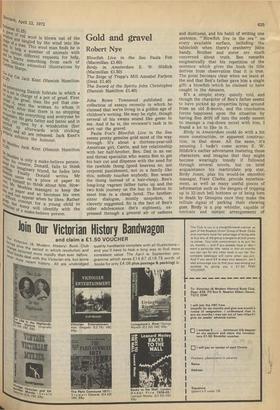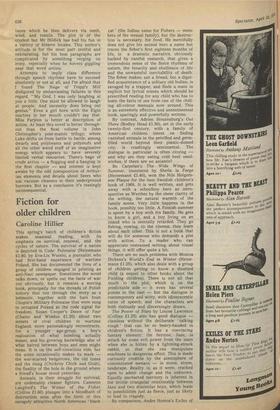Gold and gravel
Robert Nye
Blowfish Live in the Sea Paula Fox (Macmillan £.1.60) Birdy in Amsterdam E. W. Hildick (Macmillan £1.50) The Seige of Trapp's Mill Annabel Farjeon (Dent £1.40) The Sword of the Spirits John Christopher (Hamish Hamilton £1.40) John Rowe Townsend published an collection of essays recently in which he claimed that we're living in a golden age of children's writing. He may be right, though several of his swans sound like geese to me. And if he is, the reviewer's task is to sort out the gravel. Paula Fox's Blowfish Live in the Sea seems pretty genuine gold most of the way through. It's about a thirteen-year-old American girl, Carrie, and her relationship with her half-brother, Ben. Dad is an ear and throat specialist who wants Ben to get his hair cut and dispense with the need for the rawhide thong (good heavens no, not corporal punishment, not in a family like this, nobody touches anybody, Ben wears the thong instead of a hair-clasp). Ben's long-long vagrant father turns up and the two kids journey on the bus to Boston to meet him in a cheap hotel. The brothersister dialogue, mostly unspoken, is cleverly suggested. So is the fact of Ben's older adolescence (he's eighteen), expressed through a general air of sadness and dustiness, and his habit of writing one sentence, "Blowfish live in the sea" on every available surface, including the tablecloth when there's cranberry juice handy. Brother and sister are much concerned about truth. Ben remarks enigmatically that his repetition of the sentence which gives the book its title derives from observation that it is true. The point beconies clear when we learn at the end that Bert's father gave him a single gift: a blowfish which he claimed to have caught in the A azon.
It's a simple story, quietly told, and though the char cter of Ben's father seems to have picked p properties lying around from an old B-itnovie, and the conclusion forces happines upon the situation by having Ben drif off into the seedy sunset to manage a ruta-down motel with him, I found a lot to like in it. Birdy in Amsterdam could do with a bit more constructiOn, or apparent construction, in that sense. All the same, it's amusing. I hadn't come across E. W. Hildick's earlier adventures featuring these characters, and imagine that they might become wearingly trendy if followed through several novels, but on brief acquaintance his inarticulate pop star, Birdy Jones, plus his would-be smoothie manager, Fixer Clarke, provide entertainment, as well as many useful pieces of information such as the dangers of tripping up in 22-inch bell bottoms or of being torn to death by Groupies once they make the telltale signal of parking their chewing gum. Birdy is a pop whistler, capable of intricate and instant arrangements of
tunes which he then delivers via teeth, wind, and tonsils. The plot is of the crudest but Mr Hildick has had his fun in a variety of bizarre locales. This author's attitude is for the most part zestful and exhilarating, but his best paragraphs are complicated by something verging on irony, especially when he hovers giggling near that word artiste.
Attempts to imply class difference through speech rhythms have to succeed absolutely or not at all, and I'm afraid that I found The Siege of Trapp's Mill disfigured by embarrassing failures in this regard. "My God, I was only laughing at you a little. One must be allowed to laugh at people. And necessity does bring out genius." Even a girl born with the Elgin marbles in her mouth couldn't say that. Miss Farjeon is better at description of action. At least this novel is better throughout than the final volume in John Christopher's post-matoic trilogy, where Luke drifts on from battle to battle, among dwarfs and polybeasts and polymufs and all the other weird stuff of an imaginative energy which appears to have severely limited verbal resources. There's bags of crude action — a flogging and a hanging in the first chapter — and interest is kept awake by the odd juxtaposition of Arthurian elements and details about Seers who use vacuum cleaners in their underground burrows. But as a conclusion it's teasingly inconsequential.











































 Previous page
Previous page